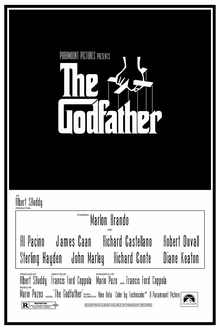
Back The Godfather Afrikaans The Godfather (cinta) AN العراب (فيلم) Arabic لعراب (فيلم) ARY الاب الروحى ARZ দ্য গডফাদাৰ (চলচ্চিত্ৰ) Assamese Xaç atası (film) Azerbaijani آتا (فیلم) AZB Хросны бацька (фільм) Byelorussian Хросны бацька (фільм) BE-X-OLD
| The Godfather | |
|---|---|
 Theatrical release poster | |
| Directed by | Francis Ford Coppola |
| Screenplay by |
|
| Based on | The Godfather by Mario Puzo |
| Produced by | Albert S. Ruddy |
| Starring | |
| Cinematography | Gordon Willis |
| Edited by | |
| Music by | Nino Rota |
Production companies |
|
| Distributed by | Paramount Pictures |
Release dates |
|
Running time | 175 minutes[1] |
| Country | United States |
| Language | English |
| Budget | $6–7 million[N 1] |
| Box office | $250–291 million[N 2] |
The Godfather is a 1972 American epic gangster film[2] directed by Francis Ford Coppola, who co-wrote the screenplay with Mario Puzo, based on Puzo's best-selling 1969 novel. The Godfather is regarded as one of the greatest and most influential films ever made, as well as a landmark of the gangster genre.[3] The film stars an ensemble cast including Marlon Brando, Al Pacino, James Caan, Richard Castellano, Robert Duvall, Sterling Hayden, John Marley, Richard Conte and Diane Keaton. It is the first installment in The Godfather trilogy, chronicling the Corleone family under patriarch Vito Corleone (Brando) and the transformation of his youngest son, Michael Corleone (Pacino), from reluctant family outsider to ruthless mafia boss.
Paramount Pictures obtained the rights to the novel for $80,000, before it gained popularity.[4][5] Studio executives had trouble finding a director; the first few candidates turned down the position before Coppola signed on to direct the film but disagreement followed over casting several characters, in particular Vito (Brando) and Michael (Pacino). Filming took place primarily in locations around New York City and Sicily, and it was completed ahead of schedule. The score was composed principally by Nino Rota, with additional pieces by Carmine Coppola.
The Godfather premiered at the Loew's State Theatre on March 14, 1972, and was widely released in the United States on March 24, 1972. It was the highest-grossing film of 1972, and was for a time the highest-grossing film ever made, earning between $250 and $291 million at the box office. The film was acclaimed by critics and audiences, who praised its performances—particularly those of Brando and Pacino—direction, screenplay, story, cinematography, editing, score and portrayal of the mafia. The Godfather launched the successful careers of Coppola, Pacino and other relative newcomers in the cast and crew. At the 45th Academy Awards, the film won Best Picture, Best Actor (Brando) and Best Adapted Screenplay (for Puzo and Coppola). In addition, the seven other Oscar nominations included Pacino, Caan and Duvall, all for Best Supporting Actor, and Coppola for Best Director.
The Godfather was selected for preservation in the U.S. National Film Registry of the Library of Congress in 1990, being deemed "culturally, historically, or aesthetically significant" and is ranked the second-greatest film in American cinema (behind Citizen Kane) by the American Film Institute. It was followed by sequels The Godfather Part II (1974) and The Godfather Part III (1990).
- ^ "THE GODFATHER (18)". British Board of Film Classification. Archived from the original on June 12, 2016. Retrieved March 26, 2022.
- ^ "The Godfather | Plot, Cast, Oscars, & Facts | Britannica". www.britannica.com. Archived from the original on December 31, 2021. Retrieved December 31, 2021.
- ^ Gambino, Megan (January 31, 2012). "What is The Godfather Effect?". Smithsonian. Archived from the original on September 10, 2018. Retrieved September 10, 2018.
- ^ Allan, John H. (April 17, 1972). "'Godfather' gives boost to G&W profit picture". Milwaukee Journal. (New York Times). p. 16, part 2. Archived from the original on November 21, 2018. Retrieved July 19, 2018.
- ^ Allan, John H. (April 16, 1972). "Profits of 'The Godfather'". The New York Times. Archived from the original on September 10, 2018. Retrieved September 10, 2018.
Cite error: There are <ref group=N> tags on this page, but the references will not show without a {{reflist|group=N}} template (see the help page).